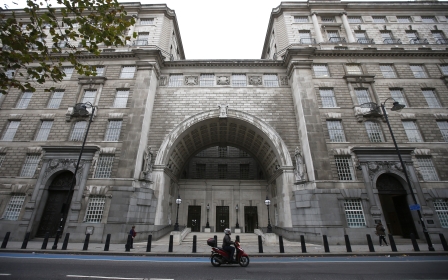MI5 policy allowing agents to commit serious crimes 'not unlawful', court rules

A policy that allows agents recruited by the UK’s Security Service, MI5, to commit serious crimes is not unlawful, a court in London ruled on Friday.
The policy, which was kept secret until March 2018, may have permitted agents recruited by MI5’s officers to commit murder or acts of torture during counter-terrorism operations, the court was told.
Nevertheless, judges sitting on the Investigatory Powers Tribunal, a court that hears complaints about the UK’s intelligence agencies, ruled three to two that the policy was not unlawful.
They said that a piece of 1989 legislation that governs MI5 contains an implied power that permits it to operate the policy, which the court heard was known as the agency’s Third Direction.
New MEE newsletter: Jerusalem Dispatch
Sign up to get the latest insights and analysis on Israel-Palestine, alongside Turkey Unpacked and other MEE newsletters
The legislation was passed at a time when agents working within terrorist organisations in Northern Ireland needed to engage in criminal acts in order to avoid exposure, and the new law expressly permitted MI5 to "continue" as before, the three judges ruled.
This did not mean that MI5's officers, and the agents that they run, are immune from prosecution, the tribunal added.
There were strongly worded dissenting judgments from two judges sitting on the tribunal, Charles Flint and Graham Zellick.
Zellick wrote that the case “exposes a tension between two vital interests – the Rule of Law and national security”.
The decision of the majority of judges on the panel opens the door to “uncertainty and a potential for abuse” of power, he warned
Flint wrote that he was unable to find any evidence that the legislation governing MI5 provided any legal basis for the policy that was being challenged.
A UK parliamentary committee that examined the country's involvement in human rights abuses following 9/11 found that MI5 or MI6, the overseas intelligence service, had helped to fund three rendition operations and planned or agreed to a further 28; supplied questions to other countries' intelligence agencies on 232 despite knowing or suspecting a prisoner was being tortured; and on 13 occasions were present when a prisoner was being tortured or mistreated.
The challenge had been brought by two London-based NGOs, Reprieve and Privacy International, and two in Northern Ireland, the Pat Finucane Centre and the Committee on the Administration of Justice.
All five judges agreed that the “case raises one of the most profound issues which can face a democratic society governed by the rule of law”.
'Knife-edge judgment'
Maya Foa, director of Reprieve, said that the court’s “knife-edge judgment, with unprecedented published dissenting opinions, shows just how dubious the government’s secret policy is”.
Daniel Holder, deputy director of the Committee on the Administration of Justice, added: “This close ruling is far from the end of the matter.”
The 1989 legislation, the Security Services Act, was passed after European courts ruled that the continent’s security and intelligence agencies must be placed on a statutory footing, and not allowed to operate in a form of legal limbo.
This created potential problems for MI5, whose agents in Northern Ireland were permitted to commit serious crimes, including murder, to avoid falling under suspicion and being themselves killed by members of the organisation that they were spying upon.
The extent of that criminality is still largely unknown, although in one case – the murder of Belfast lawyer Pat Finucane – the involvement of the British state is now clear.
Finucane had been highly effective in his defence of both republican and loyalist defendants during the Northern Ireland conflict. In February 1989 he was shot dead at his home, in front of his family.
Three subsequent official inquiries found that he had been set up for murder by a British military intelligence agent, and that MI5 and the police were also engaged in conspiracies against him.
The court heard that after the Security Services Act was passed, it was interpreted to allow the policy of permitted criminal conduct to continue.
Middle East Eye delivers independent and unrivalled coverage and analysis of the Middle East, North Africa and beyond. To learn more about republishing this content and the associated fees, please fill out this form. More about MEE can be found here.




